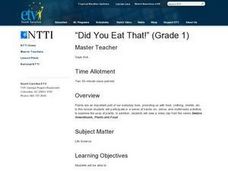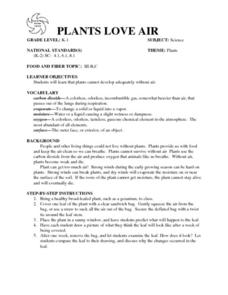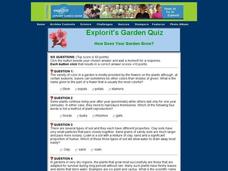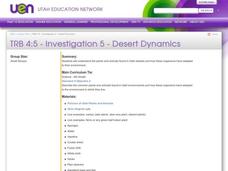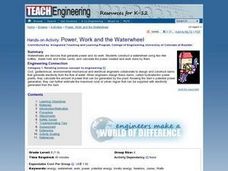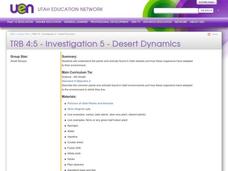Curated OER
Rice
Third graders develop a creative art project. In this rice lesson, 3rd graders learn about rice, when and how it is harvested, and how it is stored. Students make rainbow rice and use it to create other art projects.
Curated OER
$$$eaweed
Learners compare and evaluate the world's different seaweeds. In this investigative instructional activity students study seaweed and the harvesting of it. They then interpret the data collected and graph the seaweed production.
Curated OER
"Did You Eat That!"
First graders investigate why plants are an important part of our everyday lives, providing us with food, clothing, shelter, etc. In this lesson students participate in a series of hands-on, online, and multimedia activities to examine...
Curated OER
Plants Releasing Water
Third graders investigate how water is released from different plants into the atmosphere. They observe and investigate two types of plants with domed lids with condensation and communicate those observances and inquiries on an in-class...
Curated OER
Relationships and Biodiversity
Students examine diversity on the planet and the differences within a species. In this investigative lesson students complete a lab that allows students to better understand the relatedness between plants.
Curated OER
PLANTS LOVE AIR
Students identify that plants cannot develop adequately without air and predict what happens to the leaf of a geranium brought to class. They draw a picture of what they think the leaf will look like after a week of being covered....
Curated OER
Explorit's Garden Quiz: How Does Your Garden Grow?
In this plants worksheet, learners complete a 6 question multiple choice quiz about gardening, plants and agriculture. This is an online interactive worksheet.
Curated OER
Why Is An Apple Like A Suitcase?
Young scholars examine a variety of fruit to discover that each has seeds. Through experimentation, they discover the role that fruit and seeds play in a plant's life cycle.
Curated OER
Salinity Of Soil
Fourth graders investigate the contents of various types of soil to determine the differences in salinity levels. They conduct an experiment of observing the plants in the different soils. Students then determine survival rates by...
Curated OER
Science: Putting Down Roots
Fourth graders, in small groups, observe plants and note their characteristics. After drawing pictures of the plants, including their roots systems, they hypothesize in which environments the plants would best thrive. Finally, 4th...
Curated OER
Sunlight Necklaces
Third graders review the placement and role of the sun in the solar system. Using beads, they create a necklace which they can use to identify the amount of sunlight is being illuminated. In groups, they record observations on the...
Curated OER
Desert Dynamics
Students investigate the plants and animals found in Utah deserts and how these organisms have adapted to their environment. They brainstorm ways that desert plants are different from or similar to wetland plants.
Curated OER
Charge It!
Students complete an experiment using balloons to help them examine the concept of static electricity. They discover how engineers use this information to create better air filters for homes. They describe how to charge an insulator as...
Curated OER
Power, Work and the Waterwheel
Middle schoolers use a two-liter bottle, dowel rod and index cards to design and construct a water wheel. They then calculate the power created and measure the work done by the water wheel in Watts and Joules.
Curated OER
Desert Dynamics
Fourth graders examine the various types of plants and animals found in the deserts of Utah. In groups, they discover how the plants and animals have adapted to the harsh environment. To end the activity, they compare and contrast the...
Curated OER
Birth, Growth, And Development
Students understand that all living things have a life cycle that includes being born, developing into an adult, reproducing, and eventually dying.
Curated OER
Bugsicles (A Frozen Insect Larva You can Find!)
Students explore how animals survive in the winder. After attending a gall-collecting field trip, students place them in a freezer. Once frozen, the students open the gall flay larva and observe it as the larva revives. Students...
Curated OER
Five a Day
Students look up and print definitions of fruit and vegatable. They write down their food intake for three days. They identify and categorize fruits and vegetables. They research how fruits and vegetables grow. They bring in their...
Curated OER
Relationships and Biodiversity Lab Practice
In this biodiversity worksheet, students determine the relationship and complete the evolutionary tree for the plants listed. Students review genetic code and DNA sequencing. This worksheet has 1 graphic organizer, 8 multiple choice, and...
Curated OER
Terrariums for Project Pals
Students identify the components needed by plants to survive in the terrarium. In this biology lesson, students build their own terrariums using materials available. They present their project in class.
Curated OER
Pollen Tracks
Pupils participate in an artificial dig investigating imitiation rock samples that contain "pollen" from ancient plants. Students determine which plants the pollen samples came from.
Curated OER
Dino Dung!
Pupils examine how there is more to poop than they think! After reading through material, they answer a series of questions on coprolite, and explore the diet and physical attributes of dinosaurs, as well as their environment.
Curated OER
Goobers. Goobers? Goobers!
Learners begin the lesson by noting the many ways in which to use peanuts. In groups, they use the internet to research the work of George Washington Carver. They discover the allergies and nutritional information of the peanut and...




